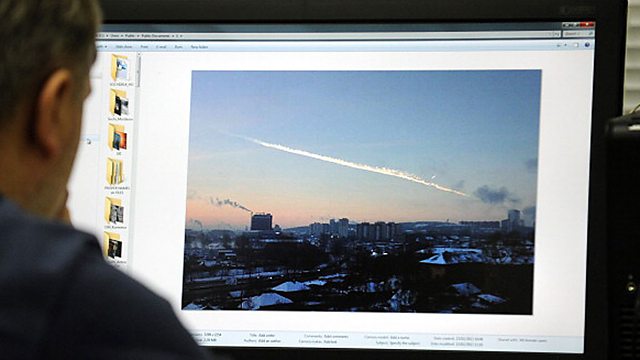
Chelyabinsk meteorite, India space launch, Intersex
How common is the type of meteorite that exploded above Chelyabinsk?
India launches a probe to study Mars
German ruling that intersex can be put on birth certificates
Chelyabinsk event sized meteors may strike Earth more frequently than thought
Scientists have been busy analysing the data received from the Chelyabinsk meteor strike on 15 February 2013. The explosion was equivalent to about half a million tonnes of TNT explosive – around 30 times the explosive power of the bombs that were dropped on Japan at the end of World War 2. Now, Professor Peter Brown and colleagues at Western University in Ontario, Canada, along with researchers in Russia, reveal more about the origin of the Chelyabinsk airburst event, alongside a 20-year analysis of similar-sized strikes that indicates these events may occur every 30 – 40 years rather than every 150 years as previously thought.
India launches Mars Orbiter
The Mangalyaan mission successfully blasted off this week from the Sriharikota spaceport in Andhra Pradesh, India. If it makes it to the Red Planet later next year, the probe will orbit Mars, studying the planetary surface and atmosphere, and will be a major step for the nation. However, some commentators have questioned whether a country with one of the highest rankings for childhood malnutrition in the world should be spending millions on a space programme at all. Angela Saini, author of Geek Nation: How Indian Science Is Taking Over The World, joins us to discuss the heritage and benefits of India’s Space Research Organisation.
Intersex people in Germany now have legal recognition.
We look at why it’s not possible to accurately determine the sex of 1 in 2000 newborn babies. Campaigners say a decision on determining the sex of a child should be delayed until the child is older. They welcome the German ruling as giving rights to people who do not readily fit the two genders of male and female.
(Photo credit: A man in Moscow looks at a computer screen displaying a picture reportedly taken in the Urals city of Chelyabinsk on February 15, 2013, showing the trail of a meteorite above a residential area of the city © AFP/Getty Images)
Last on
Chapters
-
Chelyabinsk meteorite
Airbursts similar to the 2013 event over Russia may be more common than we thought
Duration: 08:58
India space launch
Discussing India’s space heritage as the country launches a probe to Mars
Duration: 05:40
Intersex
German ruling that intersex can be put on birth certificates
Duration: 08:26
Yasser Arafat radioactive poisoning?
Scientists investigate whether late Palestinian leader was poisoned with polonium
Duration: 04:53
Transform Africa conference
Taking the temperature of the IT industry and internet penetration on the continent
Duration: 04:30
Rwanda healthcare success
Life expectancy has increased markedly in the last 20 years
Duration: 06:25
Professor Mike Benton: Dinosaur expert
Discussing dinosaur discoveries, including the colours of ancient dinosaur feathers
Duration: 11:15
Broadcast
- Sun 10 Nov 2013 14:06GMT����ý World Service Online
Podcast
-
![]()
Unexpected Elements
The news you know, the science you don't

